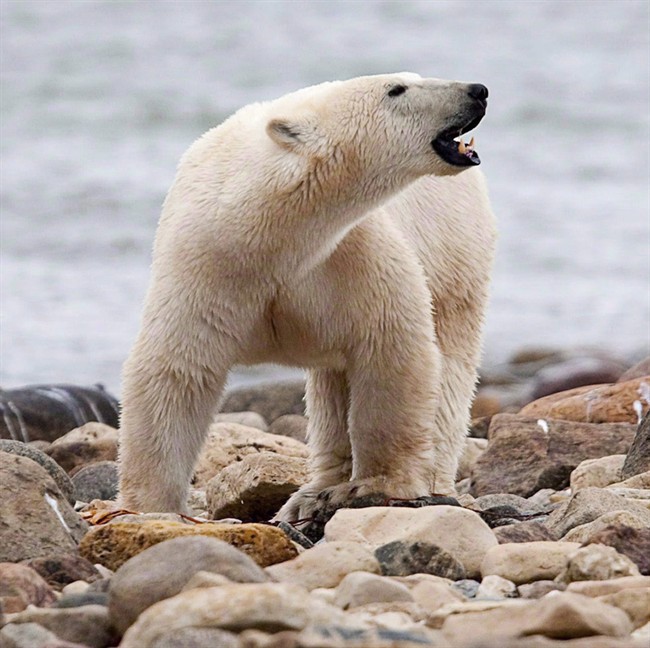OTTAWA – A NAFTA tribunal has ruled that “central open questions” remain unanswered about Canada’s enforcement of its own law when it comes to polar bears, and is seeking a full factual record of the government’s behaviour.

The ruling, tabled last month but largely overlooked by Canadian news organizations, marks the second-to-last step in an exhaustive process that began with a complaint in 2011 by the U.S.-based Center for Biological Diversity.
READ MORE: Global warming: The changing face of the Arctic
The non-governmental organization argued that Canada hadn’t followed its own rules under the Species At Risk Act, or SARA, when it failed to list polar bears as either threatened or endangered.
The Secretariat of the Commission of Environmental Co-operation, after conducting a year of study and hearing a full response from Environment Canada, ruled there are “valid assertions that a party to the agreement, Canada, is failing to effectively enforce its environmental law.”
Environment Canada noted Thursday that polar bears were listed as a species of concern in October 2011 under “strong domestic legislation to conserve and protect wildlife in Canada.”
“Our response to the submission specifically explained how the government fulfilled its responsibilities under the Species at Risk Act, including aboriginal consultations and responsibilities under the Nunavut Land Claims Agreement,” spokesman Mark Johnson said in an email.
“Our response was also very clear on (the scientific advisory panel’s) role as an organization that is independent from the government.”
The secretariat is a side body established under the North American Free Trade Agreement to ensure that Canada, Mexico and the United States live up to their own environmental laws.
READ MORE: Global warming: The changing face of the Arctic
“The secretariat finds that having considered the submission in light of the (Canadian) response, there remain central open questions about Canada’s enforcement of SARA in respect of the polar bear species,” said the ruling.
“Such information involving the case of the polar bear might also shed light on the enforcement of SARA in respect of other species.”
The three-country tribunal must decide by Feb. 21 whether to go ahead with the full study, with a simple majority of two holding the hammer.
The secretariat has no power to compel governments to act.
“It is largely shaming country governments into complying with the law,” said Sarah Uhlemann, the Seattle-based staff attorney for the Center for Biological Diversity.
“They really dig into what the facts are, what the law says, what the country did right and wrong.”
Even before a full factual study may be conducted, the secretariat makes clear it was not impressed with Environment Canada’s defence.
In bureaucratic language, the Nov. 7 report dissected the government response point by point.
It says Environment Canada made no effort to prove that it used the “best available information” to assess polar bear numbers.
The government agrees that the “effects of climate warming on conditions of sea ice are most important to the status of the species,” yet the secretariat found it did not take into account the most authoritative sea ice studies when assessing polar bear survival.
The report says cabinet decisions were delayed for years for “extended consultations” that were not explained, despite firm statutory timelines in the Species At Risk Act.
And the secretariat saved an especially acidic two paragraphs to address apparent charges of bias levelled by Canadian officials.
“The party’s statements regarding the secretariat’s supposed lack of objectivity are unsubstantiated and lack justification. … Statements impugning the secretariat’s neutrality, especially unsubstantiated statements to that effect, do not appear to have a place in the process.”
Uhlemann said she attended last week’s polar bear conference in Russia, from which federal Environment Minister Leona Aglukkaq posted a Twitter photo of a freshly killed Baffin Island polar bear with the caption, “Enjoy!!”
“I was just in Moscow with a lot of the folks that are making decisions on this issue and I think it’s putting (Canada) in a really uncomfortable position,” said Uhlemann.
“They really stand alone compared to the rest of the world in their vision of how polar bears are doing and how much we should be worried about that.”
Uhlemann noted that Canada has actually increased its hunting quota for polar bears in the last couple of years as other Arctic nations are prohibiting or very severely restricting the hunt.
“I don’t see Canada, tomorrow, making any major changes, but we are hoping this process will continue to pressure them,” she said.
“We fully anticipate that once a full look into the Canadian process is done, that Canada really is going to have to change its mind on this.”



Comments